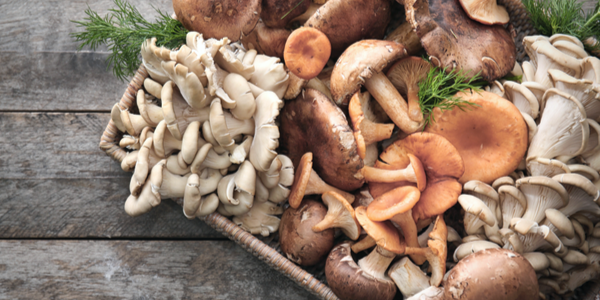
Mushrooms, while neither a fruit nor a vegetable, provide many of the same health benefits. Mushrooms are actually considered a fungus. They are a good source of vitamins, minerals, antioxidants, and fiber.
Mushrooms may have been overlooked for many years in the produce aisle, but mushroom sales have been trending up. In fact, mushrooms are one of the top trending foods for 2021 and beyond.
From pizza to coffee, the superfood that is mushrooms has been making waves all over the health community with its benefits and nutrition values.
Mushroom Nutrition
Mushrooms offer a variety of nutrients. In fact, many types of mushrooms have been used for years for their medicinal properties. Like fruits and vegetables, mushrooms are naturally low in calories and fat.
There are many types of mushrooms, and they may vary slightly nutritionally. The most common mushroom in the food supply is the button mushroom.
Mushroom nutrition for 1 cup of white button variety includes:
• 21 calories
• 0 g (grams) fat
• 1 g fiber
• 3 g protein
• 305 milligrams (mg) or 8% DV (daily value) potassium
• 1% DV vitamin D
• 3% DV vitamin C
• 2% DV iron
• 5% DV vitamin B6
• 2% DV magnesium
Overall, mushrooms are a good source of protein, fiber, and other beneficial nutrients while being low in calories.
Are Mushrooms Good for You?
Mushrooms are indeed good for you. They offer an array of health benefits; some may be surprising! Here are seven benefits of adding mushrooms to your diet.
1. Brain Health
According to Harvard Health, research has shown mushrooms may offer a protective effect against mental decline. The antioxidants in mushrooms may specifically protect brain cells from damage associated with aging. These mushroom antioxidants may help prevent the formation of amyloid proteins in the brain; amyloid proteins may be associated with Alzheimer's development.
2. Antioxidants
Besides antioxidants that may protect brain cells, mushrooms provide many other antioxidants that have anti-inflammatory and protective benefits for all body cells. In fact, mushrooms may help protect against certain types of cancer.
In Asian cultures, certain mushrooms are used as a supplement for some cancer treatments. Research is ongoing for how mushroom antioxidants may play a role in protecting cells from carcinogens
3. Vitamin D Source
Mushrooms are a rare exception as plant food being a vitamin D source. They contain a substance called ergosterol which acts similarly to cholesterol in the human body. This plant-based vitamin D is called ergocalciferol or vitamin D2.
Mushrooms can be a source of vitamin D but only if they are exposed to sunlight or ultraviolet rays when they are growing. Many commercially grown mushrooms are grown in the dark and consequently offer little to no vitamin D. However, naturally growing mushrooms or commercially grown with UV light can provide vitamin D2.
4. B Vitamins
Mushrooms are a source of B vitamins. B vitamins are needed to break down carbohydrates, fats, and protein for energy and are involved with forming new cells in the body. Mushrooms are especially a good source of vitamin B5, pantothenic acid which is needed for skin and wound healing.
5. Selenium
Selenium is a mineral that acts as an antioxidant. It can play a role in bolstering the immune system and protecting cells from damage associated with heart disease and certain cancers. Adding more mushrooms to your diet can provide this antioxidant mineral.
6. Prebiotic Source
Mushrooms are a source of prebiotics. Prebiotic food sources can promote the growth of healthy probiotic bacteria in the gut. Prebiotic foods are high in fiber and act as a food source for probiotic bacteria in the intestines.
Getting both pre and probiotic foods in the diet is important for gut health.
7. Mushroom Protein
Mushrooms are a good source of plant-based protein, which is especially vital for those limiting animal products. Protein is one of the three macronutrients and mostly known for its role in muscle synthesis.
Protein is important for weight loss as well, as high-protein diets help to control hunger and curb cravings. Protein also increases energy expenditure and enhances fat burn.
Delicious Ways to Add Mushrooms to Meals
Mushrooms are incredibly versatile and can be a part of many dishes. They have an umami like flavor and meaty texture making them a good plant based meat alternative.
Experiment with different varieties and dishes to get the most health benefits from mushrooms. These include oyster, shiitake, and white mushroom varieties.
Keep mushrooms properly stored in the refrigerator, unwashed to help keep your mushrooms lasting as long as possible at home.
Mushrooms are an iconic pizza topping, but mushrooms can go beyond a pizza topping or as a stand alone vegetable side such as garlic butter sauteed mushrooms. Below are some simple but creative ways to cook mushrooms and add to meals.
Egg Dishes
Mushrooms can be an easy addition to egg dishes like frittatas, omelets and egg scrambles. They can be thrown in with other vegetables or used alone to bring out an earthy flavor in egg dishes.
Stir Fry
If you are sauteing some vegetables for a stir fry dish, consider adding in some cut up mushrooms to the pan. Try using different varieties in a stir fry like oyster mushrooms which are traditionally used in Asian stir fry dishes.
Soup
Mushrooms can be used in soup beyond just cream of mushroom! They can be added to any vegetable based soups or shine as a main ingredient like in chicken mushroom noodle soup.
Pasta Dishes
Mushroom hunting and foraging are a tradition in certain parts of Italy, so it makes sense mushrooms are paired with pasta and other Italian dishes. Mushrooms in pasta dishes can be used with cream or tomato based sauces and with beef, seafood or used as a vegetarian meat alternative.
Another type of fungi similar to mushrooms are another popular Italian ingredient: truffles. While expensive, adding a small amount can add a lot of flavor to Italian dishes.
Mushroom Gravy
The umami flavor of mushrooms makes it a good base for a delicious, easy homemade vegan gravy. All you need is mushrooms, flour, soy sauce and broth to make a mushroom gravy that you can use wherever you would use a traditional meat based gravy.
Another way to use mushroom gravy is paired with mashed cauliflower.
Mushroom Tea
Not only can you eat mushrooms, you can also drink them. Tea can be made from dried mushrooms and may also be available in a powder form. Mushroom tea is usually made from reishi, lion's mane, chaga or cordyceps varieties.
Mushroom tea can be considered an adaptogen, a term used for herbs or mushrooms that may help the body deal with stress. Research on adaptogens is limited, and it is recommended to speak with your healthcare team before adding adaptogen teas or powders to your diet.
Meat Substitute
Mushrooms can be used as an alternative for any meats: beef, pork, chicken and even seafood because of their meat-like texture and earthy, savory flavor. Trendeing™ gives tips for the best mushroom substitute for every kind of meat.
For example, white button mushrooms may be best suited as a chicken substitute, but chanterelle mushrooms could be used as a crab substitute. Roasted or grilled portobello mushrooms can be a hearty base for a warm vegetarian sandwich.
Bottom Line
Mushrooms offer many health benefits, as they are naturally low in calories and a source of antioxidants, vitamins, minerals and prebiotics. The many types of mushrooms can be used in a variety of meals and as different meat substitutes. You can even drink mushrooms as tea.
However, it is recommended to check in with your healthcare team before taking any mushroom-based supplemental products like powdered mushroom tea.
References:
Mushrooms. The Nutrition Source. Published March 20, 2020. https://www.hsph.harvard.edu/nutritionsource/food-features/mushrooms/.
Mushroom Nutrition. Mushroom Council. Published September 24, 2020. https://www.mushroomcouncil.com/nutrition-benefits/.







